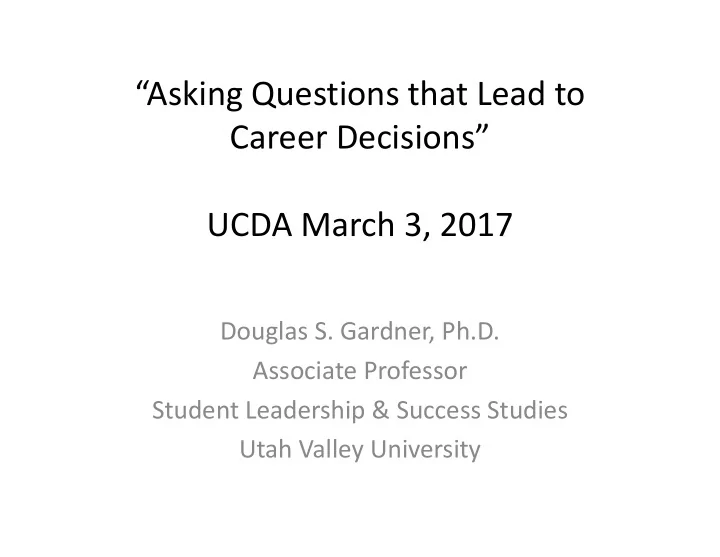

“Asking Questions that Lead to Career Decisions” UCDA March 3, 2017 Douglas S. Gardner, Ph.D. Associate Professor Student Leadership & Success Studies Utah Valley University
Claim: We need to… • Guide our students in the questions they ask. • Normalize asking questions. • Encourage curiosity.
Assumptions Theory… • With Practice leads to learning. • Allows us as practitioners to see connections. • For students leads to self‐awareness.
Cookie Monster: Questions http://www.youtube.com/watch?v=ul9MtMiIOnE
Theory… • Planned Happenstance • Career Construction (Savickas) • Intellectual Development (Perry) • Vectors (Checkering) • Psychosocial Development (Erickson) • Marcia (Identity Statuses) • Mindset (Dweck) • Well‐Being/Regulation (Neurological)
Planned Happenstance Skills of the Career Decision Maker Curiosity Risk Taking Persistence Optimism Flexibility
Planned Happenstance (Mitchell) • Reframe “… let’s start a learning process..” 1. What excites your curiosity? 2. What chance events have contributed to your curiosity? 3. What actions have you taken to heighten your curiosity? 4. What could you do next to explore the career implications of your curiosity?
Career Adaptability: Career Construction Theory (Savickas) • Adaptive Individuals: 1. Becoming concerned about their future as a worker. 2. Increasing personal control over their vocational future. 3. Displaying curiosity by exploring possible selves and future scenarios. 4. Strengthening the confidence to pursue their aspirations.
William Perry Intellectual Development Position: Question Development: • Please tell me what the 1. Dualism; knowledge is revealed truth “the right correct answer is? answer”. • My correct answer is…. 2. Multiplicity; Knowledge is subjective truth. • The based on evidence is… 3. Relativism; Knowledge is contextual understanding. 4. Commitment in • My choice, among Relativism; Creation of alternatives, is… one’s own personal world view.
Chickering Seven Vectors
Marcia Identity Statuses Identity Crisis May Not have been Experienced Foreclosure Diffusion “Giving Up” “Conformed to expectations of others” Commitment Commitment Not Made Made Achievement Moratorium “Moving forward toward identity formation” Identity Crisis Experienced
Dweck Fixed Mind‐set Growth Mind‐set Leads to a desire to look smart Leads to a desire to learn and and therefore a tendency to… therefore a tendency to… Avoid challenges Embrace challenges Challenges Give up easily Persist in the face of setbacks Obstacles See effort as fruitless See effort as the path to mastery Effort Ignore useful negative feedback Learn from criticism Criticism Feel threatened by the success of Find lessons and inspiration in Success of others the success of others. others Result: Plateau early and achieve Result: Reach ever‐higher levels less than their full potential of achievement
Leadership, Mindfulness, and Well‐Being. “How am I doing?”
Self‐Regulation • Cognitive Regulation (CR) • Emotional Regulation (ER) • Attention Regulation (AR)
Good Physical Health Empathy & Spirituality Compassion Well‐ Being Purpose & Optimism & Life Humor Satisfaction Self‐ Positive Awareness & Social Flexible Relationships Thinking
Right Questions? Many in education…have overlooked a frightening fact: finding the right answer is impossible unless we have asked the right question. Unfortunately our teaching system focuses little attention on teaching us how to ask the right questions. As a scholar, father, and advisor, I have slowly realized that asking the right question a valuable skill. That done, getting the right answer is typically quite straightforward. Video ~ Clayton Christensen, Ph.D. Professor Harvard Business School
Questions (Final) 1. What are the most important questions you have about your future career and major? 2. What are the top 5 questions you would like to answer about your career? 3. Arrange them in order of importance with number 1 being the most important question you need to answer about your future major and career.
Informational Interview and Job Shadow • Write Up… – What questions did you ask? – What do you still need to know?
Career Conversations • Talk to 5 Random People who look like the kind of people you would like to be.
Curiosity, curiosity, curiosity, what are you curious about? (2 nd Week) • Part I (Due Wed): Select a topic, any topic you are curious about. This could be something you have been interested in from your childhood, something you have learned a little about from another class, or just something you have always had questions about – Find something new about this topic and share it with the group. – Identify 2‐3 questions you still have about the topic and share those. • Part II (Due By Following Monday): Join the discussion with two (2) other students. Make a connection with and be curious about what others are interested in.
What else can we do to… • Guide our students in the questions they ask. • Normalize asking questions. • Encourage curiosity.
“Asking Questions that Lead to Career Decisions” UCDA March 3, 2017 Douglas S. Gardner, Ph.D. Associate Professor Student Leadership & Success Studies Utah Valley University
Recommend
More recommend